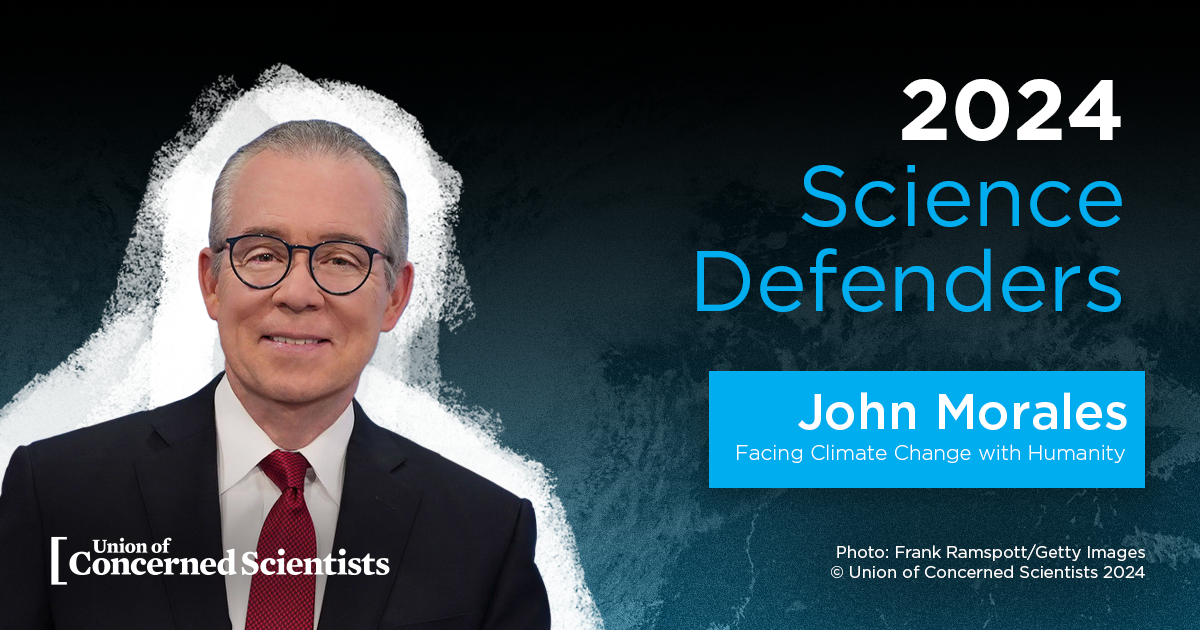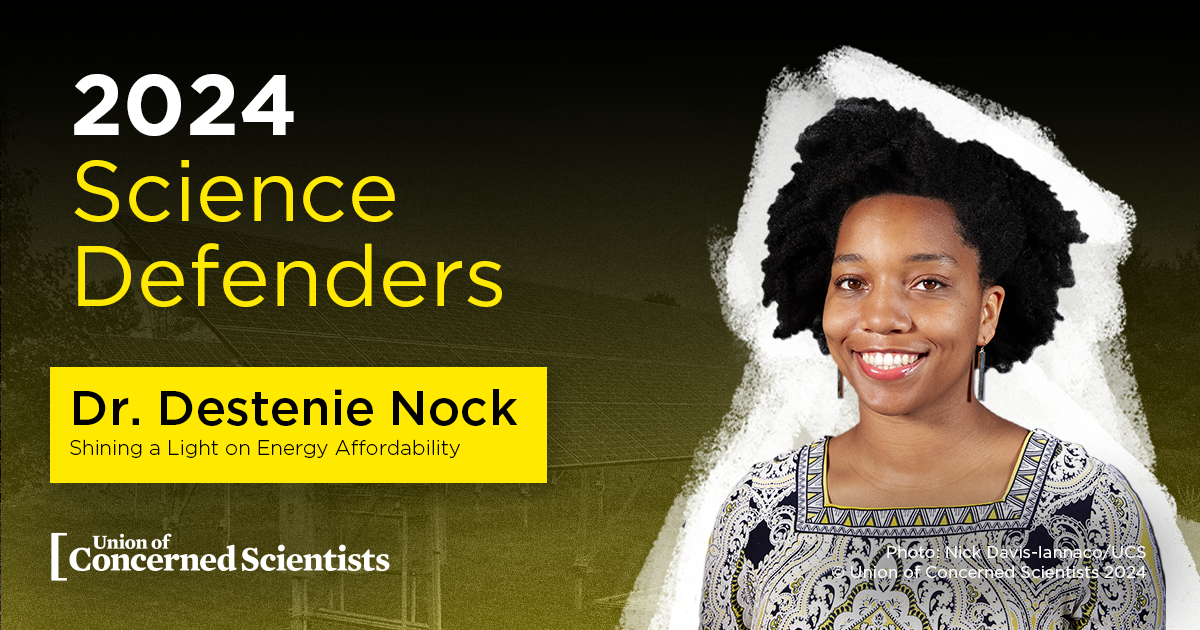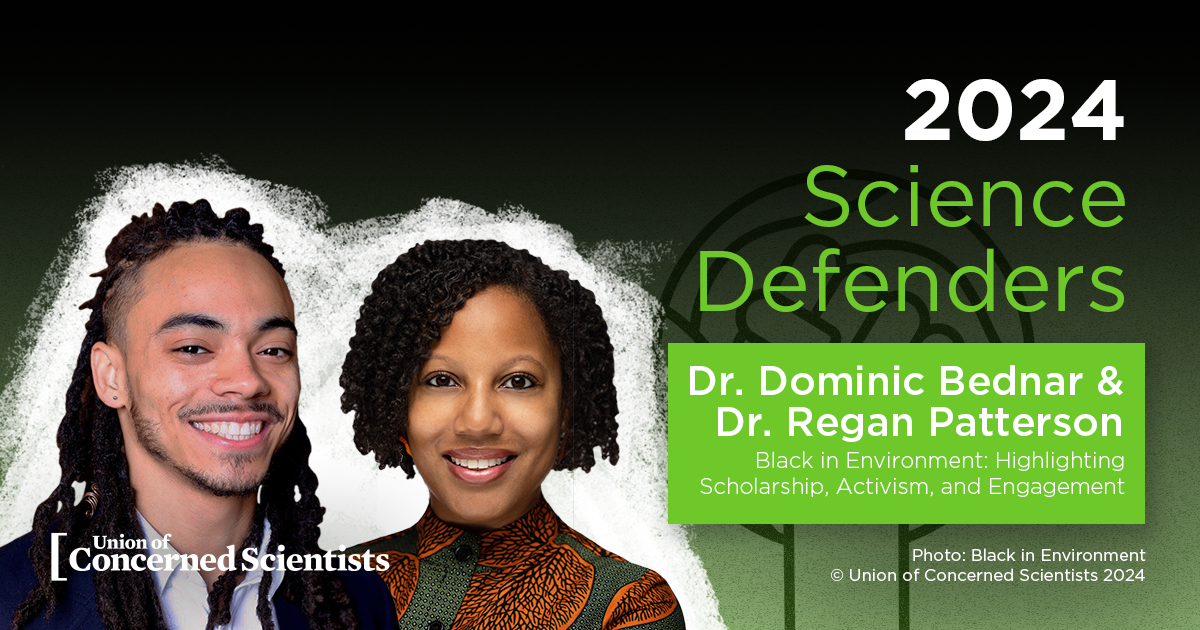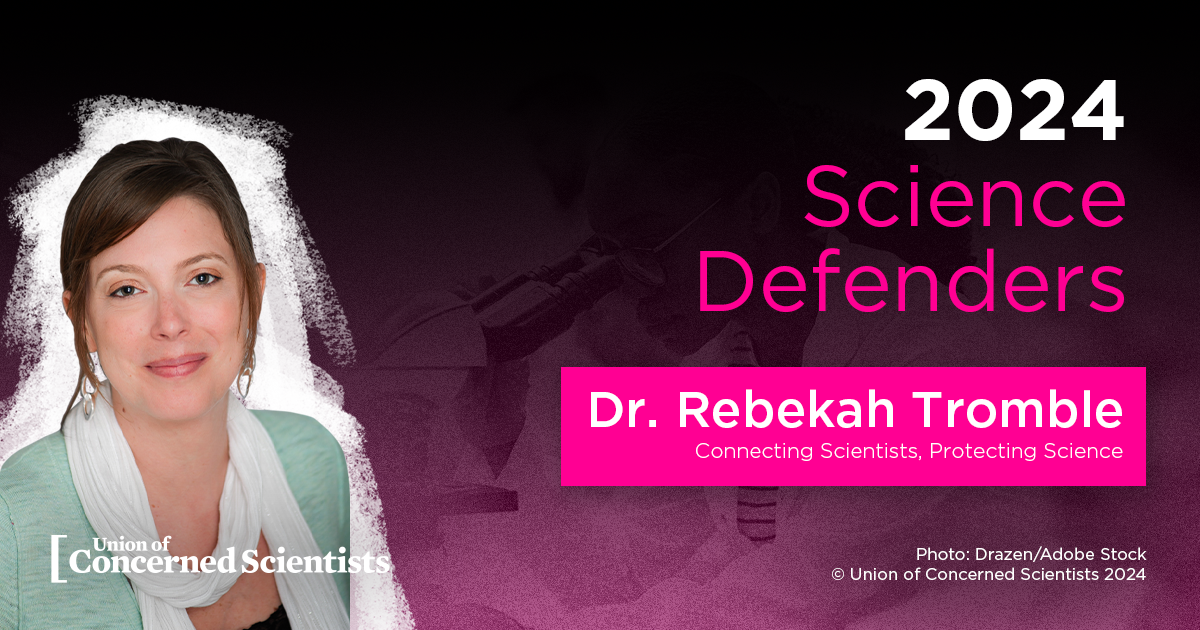At the end of each year, the Union of Concerned Scientists honors several individuals and groups who use science to improve the world and help people, including those who have taken a stand to protect science and scientists from political or other interference. We hope their courage, values, and compelling work will inspire you as they have inspired us.

John Morales: Facing Climate Change with Humanity
For people worldwide concerned about the ever more destructive and frequent storms fueled by our changing climate, meteorologist John Toohey-Morales’ honest and emotional reaction to Hurricane Milton’s unprecedented rapid intensification as it approached the Florida coast in October 2024 struck a chord. Millions viewed a clip of him describing the storm’s stunning drop in pressure with a tremor in his voice.
“I used to be a cool cucumber,” Morales says. “But I’ve been in this profession for 40 years, and I don't feel I can be non-alarmist anymore. Things have changed during those 40 years, and they’re accelerating in the wrong direction. Any little disturbance out there has a chance to go through a rapid intensification cycle and end up being a monster hurricane in a snap. It’s what I saw in Milton.”
As he observed and forecasted the storm last fall, Morales says he feared for the people in Milton’s path whose safety was at risk. And as a meteorologist who consistently and clearly links extreme weather to climate change in his reporting, he also deeply felt in that moment “the frustration of communicating about this for 20-plus years, and not enough being done [about it].”
Morales has been a steady presence on the television screens of millions of south Floridians for decades. He provides his expert analysis on weather events in English and Spanish on WTVJ in Miami—including, by his estimate, hundreds of tropical storms. Although he retired from his position as Chief Meteorologist in 2022, the station retained him as a hurricane specialist; it was in this role that his Milton forecast went viral. Morales’ current responsibilities include serving as a trustee at Cornell University and as an atmospheric and environmental scientist at ClimaData Corporation, a company he founded that specializes in forensic meteorology and weather consulting. He also trains other meteorologists—consistently ranked by audiences as among the most trustworthy sources of scientific information—in science communication.
One year after Morales began his on-television career as a meteorologist, the category 5 storm Hurricane Andrew devastated southern Florida.
“I was the first degreed broadcast meteorologist in any Spanish-language newscast anywhere in the US at the time,” he says. “After Andrew, people began to recognize the need to have a knowledgeable voice providing potentially life-saving weather warnings and forecasts. We've come such a long way since then: dozens of degreed meteorologists are on Spanish-language newscasts all over the US.”
Never losing sight of the people put at risk by extreme weather, Morales, who grew up in Puerto Rico, has branched out to also provide information about storms and climate trends in Caribbean countries with ClimaData.
“These are countries with limited resources, facing the increasing negative impacts of climate change head on without a lot of support. Making sure that people are properly served with the correct information so they can save lives and property is important to me.”

Dr. Destenie Nock: Shining a Light on Energy Affordability
One in six US households is behind on their energy bills—and in grad school, Destenie Nock was one of them. The irony of having her power shut off as an industrial engineering PhD student studying energy policy was not lost on her. But the very real dangers of losing access to heat, especially in the cold New England winter, sparked a new passion to right this injustice on a larger scale.
Now an Assistant Professor at Carnegie Mellon University’s College of Engineering, Dr. Nock focuses her work on energy affordability and energy justice. The first phase of her research was to prove her lived experience was not an outlier—and in the process, she identified a unique phenomenon connecting energy use to income level. As temperatures rise in the summer months, low-income households wait longer before turning on their air conditioners. Conversely, as the weather chills leading into the winter, these same households turn on their heat earlier in the season than higher-income households.
So, Dr. Nock founded Peoples Energy Analytics, a startup that uses data analytics to evaluate energy use and proactively identify individual households that would benefit from existing support programs—whether it be subsidies for energy-efficient appliances or payment assistance services. Now, instead of relying on generic public messaging campaigns or door-to-door canvassing, a utility company can directly identify a household that might need weatherization and help keeping up with its bills in advance of issues arising, helping prevent bills from piling up or power getting cut off.
This comprehensive strategy to address energy affordability challenges has proven itself to be both cost-effective and scalable. And at the end of the day, that means wider utilization of these critical assistance programs and more households able to keep their lights and heat on. Dr. Nock is already working with utility companies serving over five million households across four states, with hopes of reaching every household struggling to cover their energy bills.
“I didn’t get into this field to be an engineer that tinkered with circuits all day,” she says. “I became an engineer because I want to actually help people. We live in a data-rich world, and we should be using this information to find people who are at risk of pipes freezing in their home, and then connect them with bill assistance.”
And Dr. Nock is quick to connect the righteous fight for energy affordability to the urgent cause of climate justice—because the first line of defense against extreme temperatures or air pollution from wildfire smoke is often a safe place to call home.

Black in Environment: Highlighting Scholarship, Activism, and Engagement
Amid the COVID-19 pandemic, the Black Lives Matter movement, and the birth of Black Birders Week—created to celebrate Black scientists and nature-lovers—Dr. Dominic Bednar was completing his PhD at the University of Michigan, and Dr. Regan Patterson was a research fellow at the Congressional Black Caucus Foundation. When they spoke on the phone, one theme continued to surface: the need for an organization that would increase the visibility of Black environmentalists, build community, and drive positive global change.
“We need to be the ones to bring this to the fore,” Dr. Bednar recalls saying to Dr. Patterson.
The two put out a call for volunteers on social media to support Earth Day programming, and their post earned a lot of views and reposts. They assembled a community and pulled together a week of events for the first virtual #BlackInEnvironWeek. Three years and three virtual event weeks later, their team was able to hold their first in-person conference in the spring of 2024.
“There was lot of magic at that conference. It was really beautiful to see the impact we had, which was beyond what we’d imagined. It reaffirms the need for this space and reinvigorates us to create it,” says Dr. Patterson of the April conference, which was held at Howard University, one of the most prestigious Historically Black Colleges and Universities (HBCUs). As with their previous programming, they convened nearly 300 participants, panelists, and speakers from the environmental space across many disciplines—including EPA Administrator Michael Regan.
As the two think about the future of the organization, long-term sustainability and longevity are on their minds. What’s been an organization bootstrapped by committed volunteers is now at a point where it will soon hire staff that can ensure the long-term viability of a project that has filled a void for many. In addition to ensuring the future of Black in Environment, connecting its community of scientists, professors, organizers, and specialists to support more community-engaged research is also top of mind as the organization embarks upon its strategic plan.
Bookmarked between the first and second Trump administrations—with a history and promise of censoring and sidelining the expertise of those in the environmental movement—Dr. Patterson says, “We are going to continue seeing the critical importance of this organization where people feel seen, heard, feel joy, and loved upon.”

Rebekah Tromble: Connecting Scientists, Protecting Science
In 2018, political scientist Rebekah Tromble was gearing up to embark on a new research project examining communication dynamics on social media when she suddenly found herself the target of an intense harassment campaign grounded in lies about her work. Thousands of strangers, online and offline, came out of the woodwork to insult and threaten her life, body and work. This harrowing experience would galvanize Dr. Tromble to build new networks of support for scientists—and change the course of her work and life forever.
Today, Dr. Tromble is the Director of the Institute for Data, Democracy, and Politics and Associate Professor in the School of Media and Public Affairs at George Washington University. She is also the co-founder of the Researcher Support Consortium—launched this year—and the Coalition for Independent Technology Research, two groups that seek to bolster and defend science as a public good, and to support scientists experiencing coordinated campaigns of intimidation and harassment.
While Dr. Tromble’s experience in 2018 was deeply isolating, she recognized that it was not unique. That’s when she decided to use her skills as a political communication scholar who studies disinformation, hate speech, and harassment to advance a broader understanding of such attacks, and to study how scientists can be better equipped to protect themselves and defend science. Though her attackers’ goal was to intimidate, isolate, and silence her, ultimately, they accomplished quite the opposite.
Dr. Tromble committed herself to “empower others who may be going through this quietly.” Though these attacks are typically focused on individual scientists, they follow a well-worn playbook deployed for broader aims, namely, to undermine public trust in science and higher education. Now, through the initiatives she has co-founded, she’s working to dismantle that playbook via institutional interventions and direct support for scientists.
The Researcher Support Consortium, which she created alongside Professor Kathleen Searles (University of South Carolina), offers research-backed resources to help scientific funders and institutions understand the problem and effective interventions, including a toolkit that contains sample policies and step-by-step guidance for universities.
The antidote to isolation is community. That’s why Dr. Tromble has dedicated the past six years to building a unified scientific community, “with shared core values like the scientific process, practice, and integrity, all of which are jeopardized when scientists face bad faith occupational intimidation.” Come 2025, when attacks on science are anticipated to grow just like they did during the first Trump administration, Dr. Tromble looks forward to launching a new initiative she co-founded, Expert Voices Together, focused on providing direct crisis-response support services to targeted scientists.